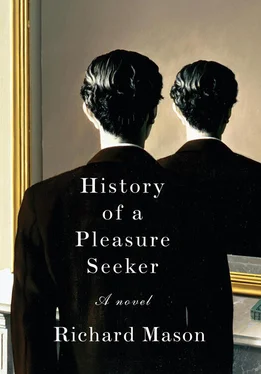“But, madam,” said Maarten. “No bank has sufficient reserves to satisfy all its depositors at once. If everybody would simply calm down …”
But it seemed that no one was prepared to calm down. As 34th Street filled with anxious clients, the panic of the crowd began to take hold of Maarten too. Not only did he require a further million dollars in credit; the $500,000 he had raised in Amsterdam was in the trust company’s vaults and its loss would precipitate a crisis he might not survive.
The Knickerbocker closed its immense bronze doors promptly at five o’clock, while there remained dozens of people ahead of Maarten in the queue. Were it not for the lady in fox fur he might have abandoned his stoicism and begun to shout, as others were doing. Instead he said good-bye calmly and walked through eddying crowds to his hotel. From the newspapers he learned that J. P. Morgan had gathered the city’s leading financiers in his library to find a way of preventing a full-scale run on the banks; also that the National Bank of Commerce had refused to clear the Knickerbocker’s checks.
It annoyed Maarten profoundly to be a nonentity in this tangled city. In Amsterdam he would have been in Morgan’s library, taking decisions. In New York he was just another fellow in a fix.
He found his wife having hysterics in front of the hotel’s manager. A sapphire choker was missing and her pearl earrings. (She had not yet discovered the loss of the peacock-blue dress.) “My maid never forgets to lock the safe. It must have been forced,” she was shouting, her voice high and distracted.
The Metropole’s manager was used to defending his staff from the accusations of absent-minded patrons. He pointed out most respectfully that no violence had been done to the safe. “Could you, perhaps, have taken the jewels off elsewhere, madam?” he asked gently, and when Jacobina insisted that she had not, and that her maid would have found them if she had, he put on his gravest face and said: “Is your own servant wholly to be trusted?”
“Of course,” snapped Jacobina.
But she was wrong.
Agneta Hemels had lived her life scrupulously. She had cared for her parents, both now dead, and worked very hard to pay her older brother’s gambling debts. She had never stolen anything in her life. But as she stepped daintily down Fifth Avenue in Jacobina’s gown and Constance’s jewels, she found the experience addictively delightful.
She went into a shop and was fussed over by the attendants. It was a jeweler’s, and she asked to see several diamond bracelets. For a happy fifteen minutes she behaved as if she might buy one. No one had ever bowed and scraped before Agneta Hemels, nor told her that wrists as graceful as hers deserved the best. She pretended to consider an emerald ring, but in fact she was weighing another possibility that had opened before her, as glittering as the stone on her finger.
If she chose to disappear in this vast country of adventurers, she was sure she could. “I shall return tomorrow,” she told the tail-suited salesman, deceitfully. “Keep the ring and those two bracelets aside for me.”
She left the shop trembling. It was almost six o’clock. She walked back towards the Metropole, wondering if there was a God and, if so, what He would do to her if she did what she was contemplating. (If He existed, she was sure He was a “He.”) Agneta had sat through hundreds of church services but could never decide if she truly believed. As she reached the hotel she set the Deity a test: she would enter like a guest and ride the lift in her finery. If she was seen and apprehended she would face the consequences. If not, she would claim her reward for the years she had spent anticipating other people’s whims.
The doorman bowed low to her. So did the elevator attendant. Neither Maarten nor Jacobina was in the lobby, and she gained her own room without incident. Once in it she undressed quickly, put on a dress of her own, packed the peacock-blue satin in her valise with all the underwear she possessed, placed the sapphire choker and pearls between its folds, called a bellboy and instructed him to take the case downstairs and to order a cab for her. Next she went to the Vermeulen-Sickerts’ suite, which the hotel’s manager had just left, and expressed the greatest outrage that someone should have profited by her absence to steal from her beloved mistress.
She helped Jacobina undress and advised her to lie down before dinner. She ordered some bouillon for Maarten, whose ashen face irritated her. How easily he could bear the loss of a few precious stones! She left him trying to place a telephone call to Philadelphia and went into his wife’s dressing room. There she selected five gowns, two cloaks, seven pairs of shoes and a muff and packed them in a trunk, into which she also placed the contents of Jacobina’s jewel box and a quantity of cash. She put on a double-breasted traveling dress with a velvet collar and a chic hat. The dressing room had its own door to the corridor and she summoned a footman to take her luggage downstairs.
Again the elevator attendant bowed to her. As the doorman lifted her into her hired carriage, she pressed a dollar bill into his hand. It was all the spending money Jacobina had given her and it gave her pleasure to leave it behind. “Grand Central Station,” she told the driver; and when they had turned the corner and no one had run after her, she began to cry with happiness.
The revelation of Agneta Hemels’ perfidy shook Maarten profoundly and contributed to his conviction that old certainties were crumbling. He discovered that the maid had bolted when she failed to wake them the next morning, and the trauma of the missing jewels delayed him so long that by the time he reached the Knickerbocker Trust Company, the line to its door stretched halfway round the block.
The rumor was that J. P. Morgan and his associates were prepared to let the Knickerbocker fail. Many in line — men and women — were fighting back tears. Others were angry. Maarten took his place burdened by an awful resignation. He knew he had lost his money.
It was the will of God.
And so it proved. Soon after midday, the great bronze doors were closed to screams of protest. In three hours that morning, more than $8 million had been paid out in cash—$500,000 of it was Maarten’s own and lost for good. He could hardly believe it and yet, now that the disaster had occurred, he saw that he had been expecting it.
He went to other banks but he knew it was hopeless and it was. The call money rate on the New York Stock Exchange was nearing 100 percent and no one was lending. “We must go home, my dear,” he told Jacobina. “I can barely pay the hotel bill as it is.” And that evening they took the midnight sailing to Liverpool and for the first time since her girlhood Jacobina packed her own clothes.
The ship’s extravagance reproached Maarten and he spent the first three days of the voyage in bed. On the morning of the fourth he woke early and crept from their darkened cabin to a stretch of isolated deck and thought. It was no use trying to save himself if God was against him. Nothing he attempted would work; the Almighty had made that clear by bringing the entire banking system of the United States to its knees, merely to punish him. Before he took any practical steps it was vital to regain the affections of his Creator — unless, of course, he was predestined to damnation, in which case … He knelt heavily, not caring that a steward had appeared to lay out the deck chairs, and threw himself on the mercy of his Maker. He was used to dreading the flames of hell, but earthly success had so far shielded him from more immediate manifestations of divine disfavor. He prayed until the steward asked him if he would care for some coffee; and this interruption broke his concentration, leaving him answerless and afraid.
Читать дальше












